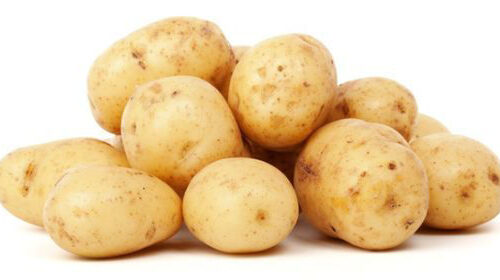
Title: Potatoes: Definition, Types, and Benefits
Introduction:
Potatoes are among the most popular vegetables worldwide. In addition to their delicious taste and versatility in various dishes, potatoes are rich in essential nutrients that provide numerous health benefits. This article aims to explore the definition of potatoes, their different types, and the various advantages they offer.
Definition: Potatoes, scientifically known as Solanum tuberosum, are starchy root vegetables that belong to the Solanaceae family. They are grown worldwide and are a staple food in many cultures due to their availability, affordability, and nutritional value
Types of Potatoes:
- Russet Potatoes: Also known as Idaho potatoes, russet potatoes have a rough, netted brown skin and a fluffy texture when cooked. They are commonly used for baking, mashing, and frying.
- Red Potatoes: Red potatoes have a thin, smooth red skin and a creamy texture. They are suitable for boiling, roasting, and using in salads.
- Yukon Gold Potatoes: Yukon Gold potatoes have a yellowish-brown skin and a buttery, moist flesh. They are versatile and work well in mashed potatoes, soups, and gratins.
- Fingerling Potatoes: Fingerling potatoes are small and elongated, resembling fingers. They come in various colors, including yellow, red, and purple. They are often roasted or used in salads.
- Purple Potatoes: Purple potatoes have vibrant purple flesh and skin. They are high in antioxidants and are great for boiling, roasting, or using in salads to add a pop of color.
Benefits of Potatoes:
- Nutritional Value: Potatoes are a rich source of vitamins, minerals, and dietary fiber. They provide essential nutrients like vitamin C, potassium, vitamin B6, and manganese, which support overall health and well-being.
- Energy and Satiety: Potatoes are a great source of carbohydrates, which are the body’s primary energy source. They also contain dietary fiber, which aids in digestion and helps promote a feeling of fullness, aiding in weight management.
- Heart Health: Potatoes are naturally low in fat and cholesterol. They also contain potassium, a mineral that helps regulate blood pressure levels and maintain heart health.
- Antioxidants: Potatoes contain antioxidants like vitamin C and various phytochemicals, which help protect the body against oxidative stress and reduce the risk of chronic diseases, such as certain cancers and cardiovascular diseases.
- Digestive Health: The dietary fiber present in potatoes promotes a healthy digestive system by preventing constipation and supporting regular bowel movements.
ConclusiPotatoes are not only a versatile and delicious vegetable but also a nutritious addition to a balanced diet. With their various types and numerous health benefits, including being a good source of vitamins, minerals, and fiber, potatoes contribute to overall well-being. Incorporating potatoes into meals can enhance the nutritional value and provide a satisfying culinary experience.on:




